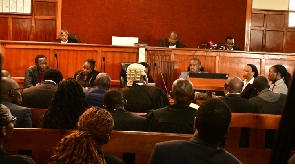 A court session during the ruling of 2023 Finance Bill at the Milimani Law Court in Nairobi, Kenya.
A court session during the ruling of 2023 Finance Bill at the Milimani Law Court in Nairobi, Kenya.
Kenyans will continue paying the Housing Levy albeit for the next one month, after the High Court suspended an earlier judgement that found the law unconstitutional until January to allow the government to move to the Court of Appeal.
The court suspended their judgment until January 10, 2024, after the Kenya Revenue Authority (KRA), attorney general and Speaker of the National Assembly Moses Wetang’ula pleaded with the judges to grant them a stay, for at least 45 days.
“We have no doubt this court has jurisdiction to grant orders of stay pending appeal even after declaring a certain decision unconstitutional,” Justice David Majanja said in a short ruling.
Justices Majanja, Christine Meoli and Lawrence Mugambi ruled that they were of the view that they do not have the last word on the matters at hand.
“The respondents are also entitled to exercise the right of appeal, to the court of appeal and even the Supreme Court. We are inclined to grant the stay for a temporary period, pending the filing of the formal application at the Court of Appeal,” Justice Majanja said.
In the earlier decision, the three-judge bench dealt a blow to President William Ruto’s housing programme after declaring the Housing Levy unconstitutional for being discriminatory and creating unequal principles.
The judges ruled that Section 84 of the Finance Act, which amends the Employment Act to introduce the Housing Levy violates the principles of taxation for making distinction between formal and informal sectors, thus creating unequal and inequitable principles.
The court added that the enactment of laws must be supported with a rational explanation but in the case of the Housing Levy, the government failed to explain the imposition of the levy or a legal framework to anchor the fees.
All employees, whether on permanent and pensionable terms or contract-based engagements, started contributing to the Affordable Housing Fund in July 2023, when the act came into force.
“An order is granted prohibiting the respondent from collecting or charging or otherwise charging on Affordable Housing Act based on section 84 of the Finance Act and all prayers on the consolidated petition not specifically granted,” Judge Majanja who read the ruling said.
The court, at the same time, said the Finance Act, 2023 is a Money Bill and the argument that the concurrence of both Speakers of the National Assembly and Senate was required before the law was enacted, does not stand.
Although the judges found that there were anomalies in the passage of some sections contained in the Finance Act, they were not serious about negating the law.
In the process, the judges upheld the 16 per cent VAT on insurance premiums, the digital asset tax, and the betting tax, saying they were constitutional and within the mandate of the Parliament.
Justices Majanja, Meoli and Mugambi said it was wrong to argue that amendment of section 2 of the Finance Act on Income Tax Act, which imposes taxes on entertainment, interferes with the function of the county governments.
According to the court, the amendment does not affect the functions of the county governments as argued by Busia Senator Okiya Omtatah and other petitioners in the case.
Senator Omtatah had argued that both speakers should have considered whether the Bill concerned counties and if so, whether it was a special or ordinary bill and resolved the questions before the Finance Bill was enacted.
The judges ruled that looking at the evidence presented before them, the public participation conducted by the National Assembly was sufficient.
In early August, the government backdated the Housing Levy deductions to July 1, 2023, and appointed the Kenya Revenue Authority (KRA) as the collection agent.
That was after the Court of Appeal overturned an order suspending the implementation of the Finance Act 2023 after Treasury Cabinet Secretary Prof Njuguna Ndung'u argued that the government was losing billions of shillings as a result of the freeze.
In a statement on August 2, 2023, the State Department for Housing and Urban Development said the levy would be payable by the employee and the employer at the rate of 1.5 per cent of the employee's gross monthly salary as outlined in the Finance Act 2023.